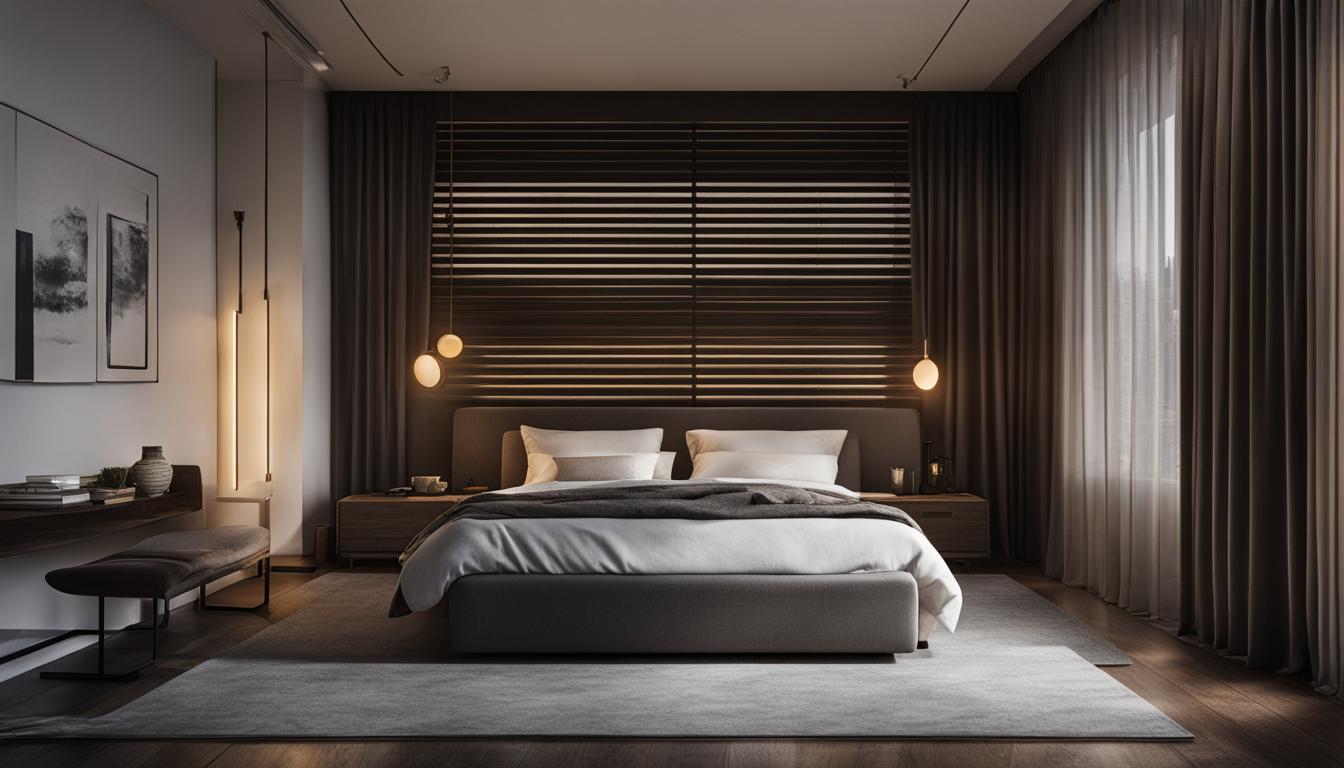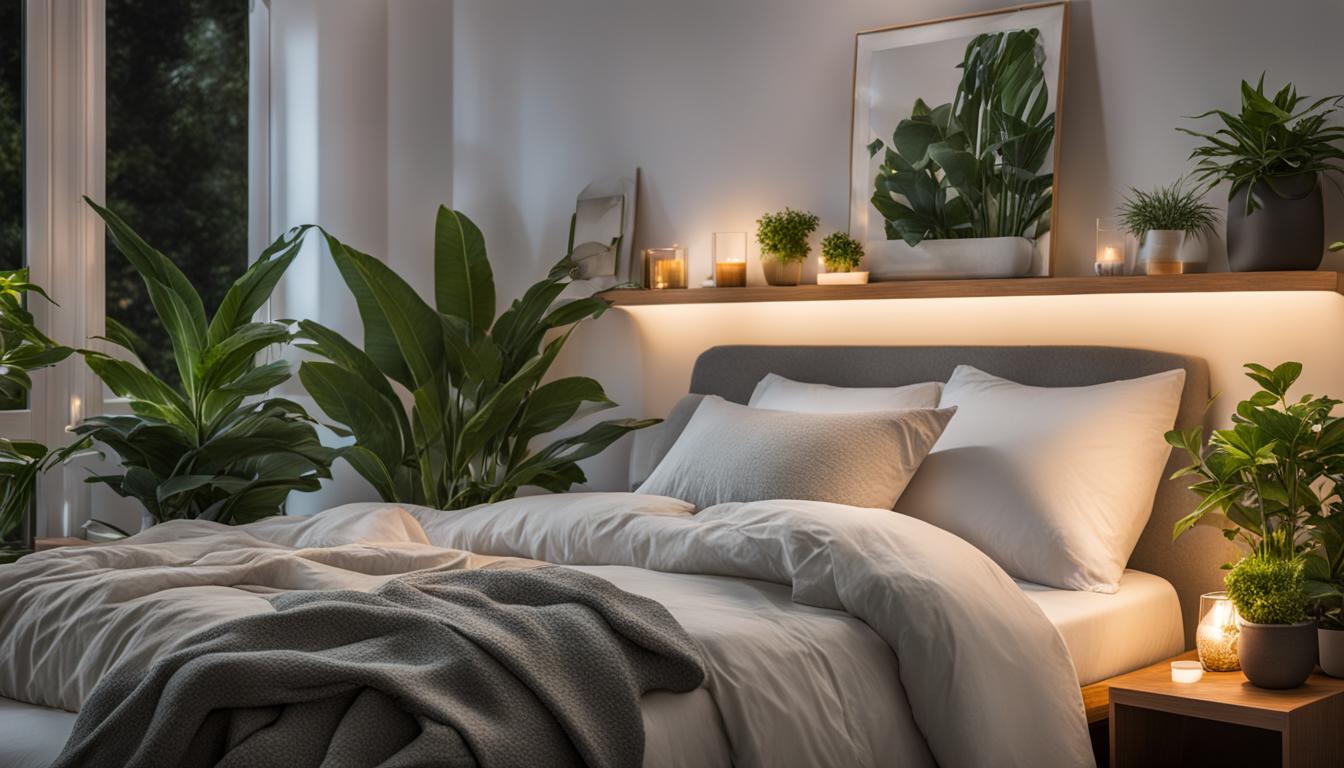Having trouble getting a good night’s sleep? Developing healthy sleep habits is key to improving sleep quality and promoting overall well-being. By incorporating natural sleep remedies, following sleep tips, and practicing good sleep hygiene, you can establish a consistent sleep schedule and create a bedtime routine that promotes restful sleep. These healthy sleep habits are crucial for addressing sleep disorders, improving sleep patterns, and achieving better overall health.
Key Takeaways:
- Developing healthy sleep habits is essential for better sleep quality and overall well-being.
- Incorporate natural sleep remedies and follow sleep tips to improve sleep patterns.
- Practice good sleep hygiene by establishing a consistent sleep schedule and bedtime routine.
- Address sleep disorders by seeking medical guidance if necessary.
- Remember that healthy sleep habits contribute to better overall health.
The Importance of Daily Wellness for Better Sleep
Daily wellness is key to promoting better sleep and overall well-being. Incorporating activities that prioritize your physical and mental health can have a positive impact on sleep quality. By focusing on daily wellness practices such as exposure to daylight, maintaining a consistent sleep schedule, limiting napping, following a balanced diet, and reducing stress, you can improve your sleep and wake up feeling refreshed.
Getting at least 30 minutes of exposure to daylight each day helps regulate your body’s internal clock, known as the circadian rhythm. This can promote alertness during the day and better sleep at night. Try to spend time outdoors or near natural light sources, especially in the morning.
A consistent sleep schedule is essential for establishing healthy sleep patterns. Going to bed and waking up at the same time every day, including weekends, helps align your body’s internal clock and promotes a more restful sleep. Consistency is key.
While napping can be tempting, it’s important to limit daytime napping to no more than 20 minutes. Longer naps or napping late in the day can interfere with your ability to fall asleep at night.
A balanced diet plays a significant role in overall health, including sleep. Avoid heavy meals close to bedtime, as they can cause discomfort and disrupt sleep. Instead, opt for lighter, nutritious meals that support a healthy sleep routine.
Reducing stress is crucial for better sleep. Engage in stress-reducing activities such as meditation, deep breathing exercises, or yoga to promote relaxation before bedtime. Creating a calm and peaceful environment prepares your mind and body for a more restful sleep.
Incorporating these daily wellness habits into your life can help improve sleep quality and set the stage for a night of rejuvenating rest. By prioritizing your physical and mental well-being, you can create a foundation for better sleep and overall health.

Building a Better Sleep Routine
Establishing a healthy sleep routine is crucial for achieving better sleep and improving overall well-being. A consistent sleep routine helps regulate your body’s internal clock, making it easier to fall asleep and wake up refreshed. Here are some key elements to consider when building an effective sleep routine:
Aim for Seven Hours of Sleep
Getting the recommended seven hours of sleep each night is essential for optimal health and well-being. Make it a priority to allocate enough time for sleep in your schedule to ensure you can consistently achieve this goal.
Follow a Consistent Pre-Bed Routine
Establishing a consistent pre-bed routine can signal your body that it’s time to unwind and prepare for sleep. Engage in activities that promote relaxation, such as deep breathing, reading a book, stretching, or meditating. These practices can help reduce stress and calm your mind in preparation for sleep.
Create a Designated Sleep and Sex Space
Designate your bedroom as a space solely for sleep and intimate activities. By associating your bed with rest and relaxation, you can create a positive sleep environment. Avoid using your bed for work, watching television, or other stimulating activities that may interfere with sleep.

Get Out of Bed When Unable to Sleep
If you find yourself unable to fall asleep after being in bed for about 20 minutes, it is recommended to get out of bed and engage in a quiet, relaxing activity until you feel sleepy. This avoids associating your bed with the frustration of being unable to sleep, helping to maintain a positive sleep environment.
Set Your Phone to Silent
Before heading to bed, set your phone to silent mode or keep it in another room to reduce disturbances during the night. The notifications and screen brightness from electronic devices can disrupt your sleep and make it harder to relax.
Avoid Clock-Watching
Staring at the clock can create anxiety and stress, making it even more difficult to fall asleep. Instead, try turning your clock away from you or removing it from the bedroom altogether. Trusting your body’s internal cues and allowing sleep to happen naturally can help promote a more peaceful sleep experience.
A consistent sleep routine can significantly improve the quality of your sleep and overall well-being. Incorporate these practices into your daily life and adjust them to suit your needs. By prioritizing a healthy sleep routine, you can cultivate better sleep habits and enjoy the benefits of a restful night’s sleep.
Optimizing Your Sleep Environment
Creating an optimal sleep environment is essential for better sleep. By implementing a few changes to your bedroom, you can greatly improve your sleep quality and overall restfulness.
Reduce Noise
Minimize distractions by reducing or blocking out noise in your bedroom. Consider using earplugs or white noise machines to create a quiet and peaceful sleeping environment.
Keep the Bedroom Dark
Create a dark sleeping environment by using blackout curtains or wearing a sleep mask. Blocking out external light sources can help signal to your body that it’s time to sleep.
Optimal Temperature
Set your bedroom temperature between 65 and 68 degrees Fahrenheit for optimal sleep comfort. Maintaining a cool temperature can promote better sleep and prevent overheating during the night.
Supportive and Comfortable Mattress
Invest in a supportive and comfortable mattress that suits your specific needs. A mattress that promotes proper sleep posture can help alleviate discomfort and enhance sleep quality.

Aromatherapy
Consider using aromatherapy in your bedroom to create a soothing and relaxing atmosphere. Scents like lavender have been shown to promote better sleep and relaxation. Experiment with essential oils or sprays to find what works best for you.
Choose a Good Pillow
Having a good pillow is crucial for neck and spinal alignment. Choose a pillow that suits your preferred sleeping position (such as side, back, or stomach) and provides the right level of support for a comfortable night’s sleep.
Improve Bedroom Ventilation
Proper ventilation is important for maintaining fresh and clean air in your bedroom. Ensure that your bedroom has adequate airflow by opening windows or using fans. Good ventilation can help regulate temperature and reduce stuffiness in the room.
By optimizing your sleep environment with these simple adjustments, you can create a peaceful and comfortable space that promotes better sleep and rejuvenation.
Following Healthy Sleep Tips
Improving sleep quality requires following healthy sleep tips that encompass various aspects of your routine and environment. By implementing these tips, you can create an optimal sleep environment and establish consistent sleep patterns for better rest and overall well-being.
Maintain a Consistent Sleep Schedule
A consistent sleep schedule is crucial for regulating your body’s internal clock and promoting healthy sleep patterns. Aim to wake up and go to bed at the same time every day, even on weekends. This helps align your natural sleep-wake cycle and optimize your sleep quality.
Establish a Relaxing Bedtime Routine
Creating a relaxing bedtime routine can signal to your body that it’s time to wind down and prepare for sleep. Engage in activities that promote relaxation and stress reduction, such as reading, taking a warm bath, or practicing deep breathing exercises. This routine can help transition your mind and body into a state of restfulness.
Create a Quiet and Relaxing Bedroom Environment
A quiet and relaxing bedroom environment is essential for promoting better sleep. Keep noise to a minimum by using earplugs or white noise machines if needed. Ensure your bedroom is free from distractions and create a peaceful ambiance that promotes calmness and relaxation.

Limit Bright Light Exposure in the Evenings
Exposure to bright lights in the evenings can interfere with your body’s production of melatonin, a hormone that regulates sleep. To improve sleep quality, limit your exposure to bright lights, especially from electronic devices, in the hours leading up to bedtime. Dim the lights in your home and consider using relaxing, low-intensity lighting in your bedroom.
Avoid Large Meals Before Bedtime
Eating large meals close to bedtime can disrupt your sleep by causing indigestion and discomfort. Instead, opt for a light, healthy snack if you’re hungry before bed. Choose foods that promote relaxation, such as a small portion of whole grain crackers or a piece of fruit. Avoid consuming caffeine and alcohol as they can also interfere with sleep quality.
Incorporate Regular Exercise and Maintain a Healthy Diet
Regular exercise and a healthy diet play significant roles in promoting better sleep. Engaging in physical activity during the day can help regulate your sleep-wake cycle and reduce stress. Avoid exercising too close to bedtime, as it can increase alertness and make it difficult to fall asleep. Additionally, maintain a balanced diet that includes sleep-supportive nutrients like magnesium and tryptophan.
Reduce Fluid Intake Before Bedtime
To minimize disruptions during the night, reduce your fluid intake in the hours leading up to bedtime. While it’s important to stay hydrated throughout the day, limiting your fluid intake before bed can help prevent trips to the bathroom that disrupt your sleep. It’s recommended to avoid drinking large amounts of liquids within two hours of bedtime.
By following these healthy sleep tips, you can create an environment conducive to restful sleep and establish routines that promote relaxation and optimal sleep patterns. Prioritizing a consistent sleep schedule, a relaxing bedtime routine, and a sleep-friendly bedroom environment sets the foundation for better sleep and improved overall well-being.
Understanding the Impact of Sleep Habits on Sleep Quality
Sleep hygiene plays a crucial role in ensuring high-quality sleep. By practicing healthy sleep habits and incorporating various strategies, individuals can significantly improve their sleep. One effective approach is cognitive behavioral therapy (CBT), a long-term treatment for insomnia that targets the thoughts and behaviors that hinder sleep. CBT includes stress reduction techniques and sleep schedule management to promote better sleep. A sleep diary can be a valuable tool in tracking sleep patterns and identifying factors that impact sleep quality.
Seeking medical guidance is essential for individuals struggling with sleep issues. Consulting with a healthcare professional can provide personalized advice and recommendations tailored to individual needs. Additionally, sleep supplements may be explored in conjunction with medical guidance to enhance sleep quality.

“Sleep hygiene is paramount in maintaining a healthy sleep routine. By incorporating healthy sleep habits, individuals can create an optimal sleep schedule and improve their overall sleep quality.”
By understanding the impact of sleep habits on sleep quality and adopting effective strategies like CBT, sleep diary tracking, and seeking medical guidance, individuals can make significant improvements in their sleep patterns and overall well-being. It’s important to prioritize sleep hygiene and establish a routine that supports optimal sleep.
Creating an Optimal Sleep Schedule
Establishing a consistent sleep schedule is essential for maintaining healthy sleep patterns. It involves setting a consistent wake-up time and adhering to it, even on weekends. This regularity helps regulate your internal body clock, making it easier to fall asleep and wake up naturally.
Avoiding long naps during the day is also important for maintaining a consistent sleep schedule. While short power naps can be beneficial for boosting alertness, longer naps can interfere with nighttime sleep. Limiting naps to 20-30 minutes and avoiding them too close to bedtime can help ensure a restful night’s sleep.
Incorporating relaxation techniques into your evening routine can also promote a healthy sleep schedule. Activities such as deep breathing, progressive muscle relaxation, or meditation can help calm your mind and prepare your body for sleep. These techniques can be particularly helpful if you find yourself feeling anxious or stressed before bedtime.
Avoiding electronics before bed is another crucial aspect of creating an optimal sleep schedule. The blue light emitted by electronic devices, such as smartphones and tablets, can interfere with the production of melatonin, a hormone that regulates sleep. Instead, consider reading a book, listening to soothing music, or practicing a calming bedtime ritual to help signal to your body that it’s time to sleep.
Exposure to natural light during the day can help regulate your body’s sleep-wake cycle, making it easier to fall asleep and wake up at the desired times. Spend time outside during daylight hours, ideally in the morning, to help synchronize your internal clock with the natural light-dark cycle.
Regular exercise is another vital component of an optimal sleep schedule. Engaging in moderate-intensity exercise, such as brisk walking or cycling, promotes better sleep quality. However, it’s important to avoid exercising too close to bedtime, as the increase in heart rate and body temperature can make it difficult to fall asleep.
Moderation in caffeine and alcohol consumption is crucial for maintaining a healthy sleep schedule. Both caffeine and alcohol can disrupt your sleep patterns and negatively impact the quality of your sleep. Limit your intake of caffeinated beverages, such as coffee and tea, especially in the afternoon and evening. Similarly, avoid consuming alcohol close to bedtime, as it can interfere with your ability to attain deep, restorative sleep.
Managing your fluid intake before bed can also contribute to better sleep quality. While it’s important to stay hydrated throughout the day, reducing your fluid intake a few hours before bed can minimize the need for nighttime bathroom trips, reducing disruptions to your sleep.
By creating an optimal sleep schedule and incorporating these practices into your daily routine, you can improve your sleep quality and overall well-being. Consistency, relaxation, and conducive sleep habits are the keys to a restful night’s sleep.
Optimizing Your Bedroom Environment for Better Sleep
Creating an optimal sleep environment is crucial for achieving better sleep. By focusing on the key elements of your bedroom environment, you can create a space that promotes relaxation and restfulness. Here are some tips to help you optimize your bedroom for better sleep:
Invest in a Comfortable Mattress and Bedding
A comfortable mattress and bedding are essential for providing proper support and ensuring a restful sleep. Choose a mattress that suits your individual needs and preferences, whether it’s a firm mattress for back support or a plush one for added comfort. Additionally, select high-quality bedding materials that are soft and breathable, such as cotton or bamboo, to enhance your sleep experience.
Minimize Light Exposure
Light exposure can interfere with your body’s natural sleep-wake cycle. To create a sleep-friendly environment, use blackout curtains or wear a sleep mask to block out external light sources. Minimizing light exposure signals to your brain that it’s time to sleep, helping you fall asleep faster and stay asleep throughout the night.

Reduce Noise
Noise disruptions can significantly impact the quality of your sleep. Consider using earplugs or investing in a white noise machine to mask sounds and create a peaceful atmosphere in your bedroom. By reducing noise distractions, you can enjoy a more restful and uninterrupted sleep.
Maintain an Ideal Temperature
The temperature of your bedroom can greatly affect your sleep quality. Aim to keep your bedroom between 65 and 68 degrees Fahrenheit (18 to 20 degrees Celsius) to create a comfortable and cool sleep environment. Adjusting the temperature to your preferences can help you fall asleep faster and experience deeper, more rejuvenating sleep.
Align Your Sleep Schedule with a Sleep-Friendly Routine
Establishing a sleep-friendly routine helps regulate your body’s internal clock and promotes consistent sleep patterns. Set a regular sleep schedule by going to bed and waking up at the same time every day, even on weekends. This consistency helps your body anticipate sleep and wake times, improving the quality of your sleep.
Optimizing your bedroom environment to prioritize comfort, minimize distractions, and create a peaceful atmosphere is essential for better sleep. By investing in a comfortable mattress and bedding, reducing light exposure and noise disruptions, maintaining an ideal temperature, and aligning your sleep schedule with a sleep-friendly routine, you can create a bedroom environment that promotes restful and rejuvenating sleep.
Conclusion
Developing and implementing healthy sleep habits is crucial for improving sleep quality and overall well-being. By incorporating natural sleep remedies, following sleep tips, and practicing good sleep hygiene, you can establish a consistent sleep schedule, create a relaxing bedtime routine, optimize your sleep environment, and address any sleep disorders. Prioritizing healthy sleep patterns and habits is the key to achieving better sleep, enhanced overall health, and improved quality of life.
Healthy sleep habits lay the foundation for a restful night’s sleep. By incorporating natural sleep remedies such as herbal teas or essential oils, you can relax your mind and body before bed. Following sleep tips like maintaining a consistent sleep schedule, practicing relaxation techniques, and minimizing exposure to electronic devices before bed can help regulate your sleep-wake cycle and promote better sleep quality.
In addition, practicing good sleep hygiene, such as creating a sleep-friendly environment with a comfortable mattress, reducing light exposure, and controlling noise and temperature, can further enhance your sleep quality. By addressing any sleep disorders and seeking medical guidance if needed, you can effectively manage sleep-related concerns and improve your overall well-being.
By adopting healthy sleep patterns and habits, you are making a positive investment in your health and overall quality of life. Prioritize your sleep, and reap the rewards of improved focus, energy, and mental well-being. Remember, a good night’s sleep starts with you.
FAQ
What are some natural sleep remedies to improve sleep quality?
Some natural sleep remedies to improve sleep quality include incorporating daily wellness activities, maintaining a consistent sleep schedule, practicing relaxation techniques, and creating an optimal sleep environment.
How can I establish a healthy sleep routine?
You can establish a healthy sleep routine by aiming to get at least seven hours of sleep every night, following a consistent pre-bed routine that promotes relaxation, using your bed only for sleep and sex, and getting out of bed if unable to fall asleep after 20 minutes.
What can I do to optimize my sleep environment?
To optimize your sleep environment, you can minimize distractions by reducing or blocking out noise, keeping your bedroom dark with blackout curtains or a sleep mask, setting the temperature between 65 and 68 degrees Fahrenheit, and ensuring you have a supportive and comfortable mattress and pillow.
What are some healthy sleep tips to improve sleep quality?
Some healthy sleep tips to improve sleep quality include maintaining a consistent sleep schedule, adopting a relaxing bedtime routine, creating a quiet and relaxing bedroom environment, limiting exposure to bright lights in the evenings, avoiding electronic devices before bedtime, and avoiding large meals, caffeine, and alcohol before bed.
How do sleep habits impact sleep quality?
Sleep habits play a crucial role in sleep quality. Practicing good sleep hygiene, such as following a consistent sleep schedule and incorporating relaxation techniques, can significantly improve sleep. Cognitive behavioral therapy (CBT) is also effective in addressing thoughts and behaviors that interfere with sleep. Keeping a sleep diary can help track sleep patterns and identify factors influencing sleep quality.
How can I create an optimal sleep schedule?
To create an optimal sleep schedule, you can set a consistent wake-up time, avoid long naps, practice relaxation techniques, avoid electronics before bed, ensure exposure to natural light during the day, engage in regular exercise, moderate caffeine and alcohol consumption, and manage fluid intake.
What can I do to optimize my bedroom environment for better sleep?
To optimize your bedroom environment for better sleep, you can invest in a comfortable mattress and bedding, minimize light exposure with blackout curtains or a sleep mask, reduce noise with earplugs or white noise machines, maintain an ideal temperature between 65 and 68 degrees Fahrenheit, and align your sleep schedule with a sleep-friendly routine.


